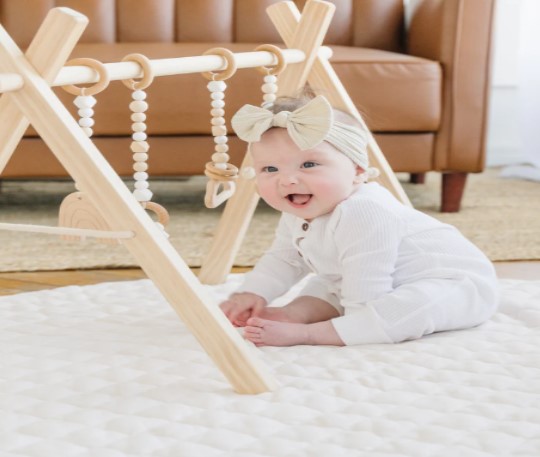As you observe children engaging with Montessori toys, you’ll notice a gradual transformation unfolding. The way their hands deftly manipulate the pieces, the focused gaze as they solve a puzzle, the coordination in their movements – all point towards a deeper significance. Montessori toys seem simple at first glance, but their impact on motor skills development is profound. Stay tuned to uncover how these toys intricately weave together play and learning, shaping essential skills for a child’s growth and development.
Benefits of Monterssior Toys
When it comes to enhancing motor skills development in children, Montessori toys, such as Poppyseed Play Baby Play Gym offer a myriad of benefits that promote hands-on learning and cognitive growth. These toys excel in fostering sensory exploration by engaging children in various textures, colors, and shapes. Through activities like sorting, stacking, and matching, Montessori toys encourage problem-solving skills as children learn to analyze, strategize, and execute solutions.
Sensory exploration is crucial for children as it helps them understand the world around them. Montessori toys provide a safe and structured environment for kids to explore different sensory stimuli, such as soft fabrics, smooth wooden surfaces, or textured shapes. This hands-on approach not only enhances their tactile senses but also improves their cognitive abilities by stimulating curiosity and creativity.
Moreover, problem-solving is a key skill that children develop through playing with Montessori toys. By presenting challenges that require logical thinking and experimentation, these toys help children learn how to overcome obstacles and achieve goals independently. As children engage with these toys, they enhance their problem-solving abilities, critical thinking skills, and resilience, setting a strong foundation for their future development.
Fine Motor Skills Development
Exploring fine motor skills development through Montessori toys can significantly enhance children’s dexterity and coordination abilities. Montessori toys are designed to help children improve their finger dexterity and hand-eye coordination through engaging activities that require precise movements. By engaging with these toys, children can enhance their fine motor skills in a fun and educational way.
Activities like stacking blocks, threading beads, or using tweezers to pick up small objects help children refine their finger movements and hand-eye coordination. These activities not only improve their physical abilities but also boost their cognitive development as they learn to focus, problem-solve, and manipulate objects with greater control.
Research has shown that children who regularly engage in activities that promote fine motor skills tend to have better handwriting, improved hand strength, and enhanced coordination overall. Therefore, incorporating Montessori toys that focus on fine motor skills development into a child’s playtime can have long-lasting benefits on their physical and cognitive development.
Gross Motor Skills Development
Developing gross motor skills is crucial for children’s physical development and overall well-being. Engaging in balance activities and coordination exercises can greatly enhance these skills. Balance activities like walking on a balance beam or standing on one leg help children improve their sense of equilibrium and spatial awareness. These activities also strengthen core muscles, which are essential for maintaining proper posture and stability.
Coordination exercises, such as playing catch or jumping rope, help children refine their hand-eye coordination and timing. These activities require the synchronization of different body parts, enhancing overall motor skills. Additionally, coordination exercises promote bilateral coordination, allowing children to use both sides of their body together effectively.
Montessori Approach Integration
Integrating the Montessori approach into motor skills development offers a holistic and hands-on learning experience for children. The Montessori method emphasizes sensory exploration and hands-on activities to enhance a child’s physical and cognitive development. By incorporating these principles into motor skills development, children are given the opportunity to engage their senses while actively participating in various tasks.
Sensory exploration plays a crucial role in the Montessori approach as it allows children to learn through touch, sight, sound, and movement. When applied to motor skills development, sensory activities such as sorting objects by texture or size, engaging in tactile experiences like finger painting, or playing with textured toys can help children refine their motor skills in a stimulating way.
Hands-on activities further reinforce the Montessori philosophy by encouraging children to actively participate in their learning process. Activities like building blocks, threading beads, or pouring and transferring objects not only improve fine motor skills but also promote concentration, problem-solving, and independence. By integrating the Montessori approach into motor skills development, children are provided with a well-rounded and enriching educational experience.
Play-Based Learning Strategies
To enhance children’s learning experiences, incorporating play-based learning strategies can foster creativity and curiosity in a hands-on educational environment. Play-based learning involves activities that encourage sensory exploration and creative expression. By engaging in activities like building with blocks, molding clay, or pretending in imaginative play scenarios, children develop essential skills while having fun.
Sensory exploration through play allows children to use their senses to investigate and learn about the world around them. Activities like squishing playdough, feeling different textures, or exploring with water and sand help children develop their sensory processing skills and understand various tactile sensations.
Creative expression in play-based learning encourages children to use their imagination and think outside the box. Whether it’s painting a picture, putting on a puppet show, or designing a structure with building blocks, children have the freedom to express themselves creatively, fostering a sense of individuality and innovation.
Incorporating play-based learning strategies into educational settings provides a holistic approach to learning, promoting cognitive, social, and emotional development in children.

